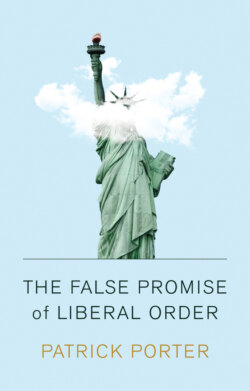Читать книгу The False Promise of Liberal Order - Patrick Porter - Страница 7
Acknowledgements
ОглавлениеI am grateful to Louise Knight at Polity for talking me into this, and to Inès Boxman who helped steer it through. Likewise, I am grateful to Chris Preble for talking me into the first version, which the Cato Institute kindly published and permitted us to draw on. And for permissions to reproduce material, thanks are due to Taylor & Francis, The Washington Quarterly, Daniel Immerwahr and Josh Shifrinson. I am grateful, for everything, to my wife Jane Rogers and to Hugh, our first-born, and to my family Brian, Muriel, Emily and Patrick, and to Frances Rogers for keeping the fires burning.
This book grew out of many conversations with friends, colleagues and worthy adversaries. My gratitude goes to David Blagden, Jeanne Morefield, Robert Saunders, Joshua Shifrinson, Tanisha Fazal, Michael Mazarr, Rosella Cappella Zielinski, Ryan Grauer, Apratim Sahay, Justin Logan, John Bew, Lawrence Freedman, Jennifer Lind, Robert Kagan, John Ikenberry, Daniel Deudney, Kori Schake, Jake Sullivan, John Mearsheimer, Stephen Walt, Barry Posen, Charles Glaser, Thomas Wright, David Adesnik, Hal Brands, Gil Barndollar, Peter Hitchens, Malcolm Chalmers, Daniel Deudney, Matt Fay, Michael Lind, Rebecca Lissner, Mira Rapp-Hooper, Asaf Siniver, Jamie Gaskarth, David Dunn, Mark Webber, Tim Haughton, Adam Quinn, Mike Sweeney, Stephen Wertheim, Daniel Nexon, Tarak Barkawi, Jerrod Laber, David Edelstein, Daniel Bessner, Chris Preble, John Glaser, Eric Gomez, Emma Ashford, Geraint Hughes, James Goldgeier, Jonathan Kirshner, Randy Schweller, Andreas Behnke, Mark Kramer and Dan Drezner.
Anyone writing about international order is in the debt of Hedley Bull and Robert Gilpin. I was never lucky enough to meet either, but hope they would have thought this book worthwhile. We are also intellectually indebted to two ‘Johns’ – Mearsheimer and Ikenberry – who, after the fall of the wall, built the theoretical floor on which the rest of us dance. The first John helped to hammer out the realist tradition that has inspired this work. And while I challenge the second John’s arguments, this book would not have been possible without his seminal body of thought.
Lastly, a word about the United States. Much of what follows is wintry. That wintriness does not flow from hostility. To the contrary, it is offered in a spirit of tough love, in solidarity with Americans and their allies who sense that something has gone very wrong. And in this century, flattery has gotten the republic nowhere.
